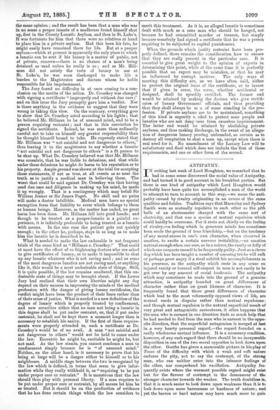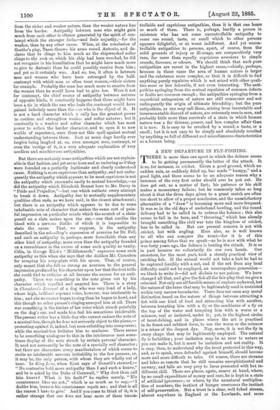ANTIPATHY.
IN. writing last week of Lord Houghton, we remarked that he had in some sense discovered the social value of Antipathy, and had turned it to good account in his breakfast parties. Bat there is one kind of antipathy which Lord Houghton would probably have been quite too accomplished a man of the world to attempt to turn to account in this way,—we mean the anti- pathy caused by rivalry originating in an excess of the same qualities and foibles. Tradition says that Macaulay and Sydney Smith were as mutually repulsive to each other as the pith balls of an electrometer charged with the same sort of electricity, and that was a species of mutual repulsion which could hardly be overcome. For it rests not chiefly on the feeling of rivalry,—a feeling which in generous minds has sometimes been made the ground of true friendship,—but on the tendency of any moral excess in one's own character, when observed in another, to excite a certain nervous irritability,—an emotion natural enough when one sees, as in a mirror, the vanity or folly-of which one suspects oneself to be frequentlyguilty. Just as a clever dog which has been taught a number of amusing tricks will sulk or perhaps grow angry if a rival exhibit his accomplishments in his presence, so the antipathy which rests in any sense on injured vanity or lowered self-respect in men is not easily to be got over by any amount of social bonhomie. The antipathy which may sometimes be made into the ground of a genuine attraction, is antipathy founded on great differences of character rather than on great likeness of character. It is frequently found that those great differences of character which lead to the most vehemently opposed views of life, are mutual needs in disguise rather than mutual repulsions; and though mutual repulsion is the natural superficial result of very great and antagonistic earnestness, it often happens that the man who is earnest in one direction finds so much help that he had needed to find from the man who is earnest in the oppo- site direction, that the superficial antagonism is merged at last in a very hearty personal regard,—the regard founded on a really wholesome mutual influence. It is a necessary condition, however, of any such regard that there should be no insuperable disposition in one of the two moral opposites to look down upon the other. Goethe has given a memorable picture in his play of Tam of the difficulty with which a weak and soft nature endures the pity, not to say the contempt, of the strong man, who can neither enter into the intenser feelings of the other, nor comprehend his vacillation. Antipathy fre- quently exists where the warmest possible regard might exist but for the flavour of contempt in the demeanour of the stronger character towards the weaker. The truth doubtless is, that it is much easier to look down upon weakness than it is to look down upon mere barrenness or hardness of nature ; and yet the barren or hard nature may have much more to gain
from the richer and weaker nature, than the weaker nature has from the harder. Antipathy between men who might gain much from each other is oftener generated by the spirit of con- tempt which the stronger feels,—and feels unjustly,—for the weaker, than by any other cause. When, at the conclusion of Goethe's play, Tasso throws his arms round Antonio, and de- clares that he clings to him much as the shipwrecked sailor clings to the rock on which his ship had been wrecked, he did not recognise in his humiliation that he might have mach more to give to Antonio than he could possibly receive from him ; and yet so it certainly was. And so, too, it often is between men and women who have been estranged by the half- contempt with which men so often treat women,—their sisters for example. Probably the man has mach more to receive from the woman than he would have had to give her. Were it not for contempt, the chief source of antipathy between natures of opposite kinds, it constantly happens that there might have been a tie in which the one who feels the contempt would have gained infinitely more than the cue who is the object of it. It is not a hard character which u wally has the greatest power to confirm and strengthen weaker and softer natures ; but it constantly is a weaker and softer character which has most power to soften the harder character, and to open it to new worlds of experience, were there not this spell against mutual understanding between them. Just as some dogs hardly ever forgive being laughed at, so, even amongst men, contempt, or even the vestige of it, is a very adequate explanation of very needless and mischievous antipathies.
But there are certainly some antipathies which are not explain- able in that fashion, and yet areas keen and as enduring as if they were founded on a perfectly legitimate and clearly understood cause. Nothing is more capricious than antipathy, and not unfre- quently the antipathy which appears to be most capricious is not the antipathy which succumbs easily to mutual knowledge,—as did the antipathy which Elizabeth Bennet bore to Mr. Darcy in "Pride and Prejudice,"—bat one which outlasts every attempt to break it down. Antipathy due to mutually supplementary qualities often ends, as we have said, in the closest attachment; but there is an antipathy which appears to be due to some indefinable note of character that makes the same sort of pain- ful impression on particular minds which the scratch of a slate- pencil on a slate makes upon the ear,—one that curdles the blood with a nervous dislike of which it is impossible to state the . cause. That, we suppose, is the antipathy described in the schoolboy's expression of aversion for Dr. Fell, and such an antipathy is, perhaps, more formidable than any other kind of antipathy, more even than the antipathy founded on a resemblance in the excess of some such quality as vanity. Celia, in George Eliot's " Middlemarch," expresses some such antipathy as this when she says that she dislikes Mr. Casaubon for scraping his soup-plate with his spoon. That, of course, only meant that she felt so strong an aversion to the general impression produced by his character upon her that the first trifle she could find to criticise at all became the excuse for an anti- pathy. There was something in the note given out by his character which repelled and angered her. There is a story in Chambers's Journal of a dog who was very fond of a lady, whose high, brilliant soprano voice, however, was intolerable to him ; and she no sooner began to sing than he began to howl, and this though no other person's singing annoyed him at all. There was something in the timbre of her voice which struck painfully on the dog's ear, and made him feel his sensations intolerable. The present writer has a little dog who cannot endure the note of a musical-box, though he does not seriously object to the piano,— .protesting against it, indeed, but soon subsiding into composure ; while the musical-box irritates him to madness. There seems to be something analogous to this in the intolerance men some- times display of the note struck by certain person' character. It need not necessarily be the note of a specially evil character; but there are characters every manifestation of which seems to excite an intolerable nervous irritability in the few persons, or, it may be, the only person, with whom they are wholly out of tune. In King Lear, when Kent says of Goneril's steward,— " No contraries hold more antipathy than I and such a knave," and he is asked by the Duke of Cornwall, " Why dost thou call him knave? What is his fault?" he replies merely, "His countenance likes me not ;" which is as much as to say,—' I dislike him, because his countenance repels me ; and that is all the reason I have to give.' And if you come to think of it, it is rather strange that one does not hear more of these uncon- trollable and capricious antipathies, than it is that one hears so much of them. There is, perhaps, hardly a person in existence who has not some uncontrollable antipathy to some one sound, taste, or smell which to other persons appears delightful, or at worst indifferent. And yet uncon- trollable antipathies to persons, apart, of course, from the solid grounds of injury or ill-usage, are comparatively very rare, far rarer than equally capricious aversions to simple sounds, flavours, or odours. We should think that such pure antipathies are rarest in the highest races,—chiefly, perhaps, because in those races the area of human nature is larger and the substance more complex, so that it is difficult to find anything purely repulsive which is not mixed with other quali- ties more or less tolerable, if not even interesting. The anti- pathies springing from the mutual repulsion of common defects or faults are common enough ; the antipathies springing from a superficial antagonism of nature are still commoner and not unfrequently the origin of ultimate friendship ; but the pure antipathies, as one may call them, arising from inscrutable and insurmountable discord of nature, are extremely rare in men, and probably little more than survivals of a state in which human nature was a far thinner, poorer, and less complex affair than it is now. It is easy to be revolted by a sound, a taste, or a smell ; but it is not easy to be simply and absolutely revolted by anything so full of different and miscellaneous characteristics as a human being.



































 Previous page
Previous page